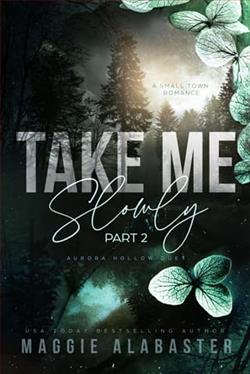Page 23 of Hidden Daughters
‘Don’t suppose so.’ She tried to add a little laugh at the end of the sentence, but the ‘so’ came out as if she’d asked a question. Too high-pitched. Too shrill. Too bloody nervous.
She found it increasingly hard to endure his touch. He tried to be loving and gentle. Too gentle. Too much. She couldn’t help her feelings, how she shuddered and squirmed in on herself. She realised she was too broken. Too damaged. She thought she’d overcome it all – that she’d ‘moved on’, as people said – but with everything resurrected again, with inquiries and podcasts and this Imelda Conroy radio documentary being made, it had bubbled back to the surface. She feared she’d explode with thememories, the emotion, the hate. Terrified that everything she’d locked into the darkest corner of her mind, deep in the recess of her soul, would resurface and she wouldn’t be able to control it. If she lost control, she might destroy all she had gained. Her husband, her home, her comfort.
He made tea and left a mug for her beside the draining board in their newly renovated bright kitchen, then went into his study to work. Work? More likely to scroll the GAA scores. But that was fine. She loved him. As much as she was capable of loving anyone. She supposed what she meant was that which passed for love.
With the last of the dishes piled and drying naturally, she wiped her hands with a towel. Rubbing harshly between her fingers, right up to her wrists, before throwing the cloth into the laundry basket in the utility room. She noticed she’d forgotten to take out a wash she’d put in earlier, so she set it to go through another cycle with fabric softener so that it wouldn’t have a fusty smell.
Back in the kitchen, she opened the wall cupboard that contained every sort of condiment on earth and took out the frosted glass bottle from the back. Her secret stash. She rationed them because it was so hard to get her GP to prescribe them. Narcotics, he’d said. Lifesavers, she’d countered with a nervous laugh. They got her through the day. That was why they were addictive, he’d insisted. But he’d lost that battle when she cried and sobbed. Six miserable pills, he prescribed. Better than nothing.
She needed one now but couldn’t afford to waste it. She broke one in half and swallowed it with her now cold tea. She no longer experienced the immediate hit she used to get at the start, but she’d be able to work and then sleep tonight, even though her dreams would be nightmares. Nightmares from the memories of what had been done. How she’d escaped one helland found herself in another. That unending loop of horror that she could never forget no matter what she did or what she took. And six miserable pills weren’t enough to take in one go to end it all. She really should save them, get more and… Stop!
She deserved to be punished.
She had to live her waking hours with the memories and stare at the ceiling in the sleeping hours remembering the barbarity of what she’d gone through and what she’d done. Or more importantly, what she hadn’t done. Silence was sometimes worse than action.
‘I am not worthy. I am useless. I am dirt. I should be dead.’ The mantra as clear to her now as it was back then. And she smiled sadly, because she believed it all to be true.
16
The cottage was quiet enough in the early afternoon sunshine, despite the echo of his knocking on the door reverberating through the small living room inside. The garda put his booted foot over the threshold, having pushed in the door with his hand because it was already open. He paused at the scene before him.
A wooden kitchen chair lay on its side, the armchair was twisted askew and the fire in the stove had long since burned to embers. A myriad of papers littered the table, which was pushed up beneath the window, and some pages had fluttered to the floor. This disarray along with the open door had prompted the walker who’d looked through the window to call the guards, believing the cottage had been burgled.
Now that he was inside, he wasn’t sure that was what had happened. Okay, it appeared a skirmish of some sort had taken place, but as to a burglary having occurred, well, he’d leave that to others to determine.
He edged inwards, shouting out, ‘Hello? Anyone home?’
His voice echoed in the stillness right before he heard a soft scuttle above his head. Mice in the attic, most likely, he thought as he ventured further into the tight space.
Tugging open an inner door, he peered into a narrow kitchen.
Toast was popped up in a toaster, a plate and knife beside it. Mugs and a wine glass were on the draining board, and the narrow counter held a sliced pan, a jar of jam and a carton of milk out of the fridge. He touched the side of the toaster. Cold. Stepping backwards, he wondered if he was gatecrashing someone’s solitary weekend away. No kettle. Odd. Maybe they, whoever they were, boiled the water in a saucepan on the two-ring hob. But there was an electrical lead dangling from a socket. Weird.
Two more rooms to check, then he was out of there. Write up his report. Head home. His shift was almost done, so he opened the first door quickly.
A bedroom. Bed made. Clothing on a chair. No sign of a struggle. Good.
The last door must be the bathroom, he told himself. The cottage was cramped, leaving him, a big man, little room to turn, but he edged forward. That was when he noticed the water pooled by his feet.
Slowly and warily he pushed the door, and was immediately hit with an odour he had smelled only once before in his career. That had been a suicide victim who hadn’t been found for four days.
Without taking another breath, he leaned forward, thrusting his head and shoulders inside. He wasn’t about to contaminate a crime scene, if that was what this was. But once he had visually assessed the horrific spectacle before him, he had no doubt that that was exactly what it was.
The body was naked, blistered and burned. Lying in a bath overflowing with water that had spilled onto the floor before some of it had seeped under the door.
His eyes were drawn from the body to the kettle on the ground in the corner. Likely the one he’d missed from the kitchen. No way did the person in the bath do this to themselves.He figured the kettle was too far away from them. His gaze returned to linger on the body, his mind a jumble of questions he knew he could not answer.
He backed away from the stench-filled space and retraced his steps to the front door. Standing on the stoop, he dry-retched before gulping a few deep breaths of clean air. He listened to birds noisily chirping in the trees, to the swish of the wind through the leaves and the roar of waves on the ocean nearby.
When his hands stopped shaking, he unclipped his radio and called in the murder.
17
The cold Atlantic wind tore into Lottie’s skin, prickling it like thrown darts.
‘Should have worn a jacket,’ Boyd said as they walked.
‘Wise words, but it’s June not November,’ Lottie replied.















